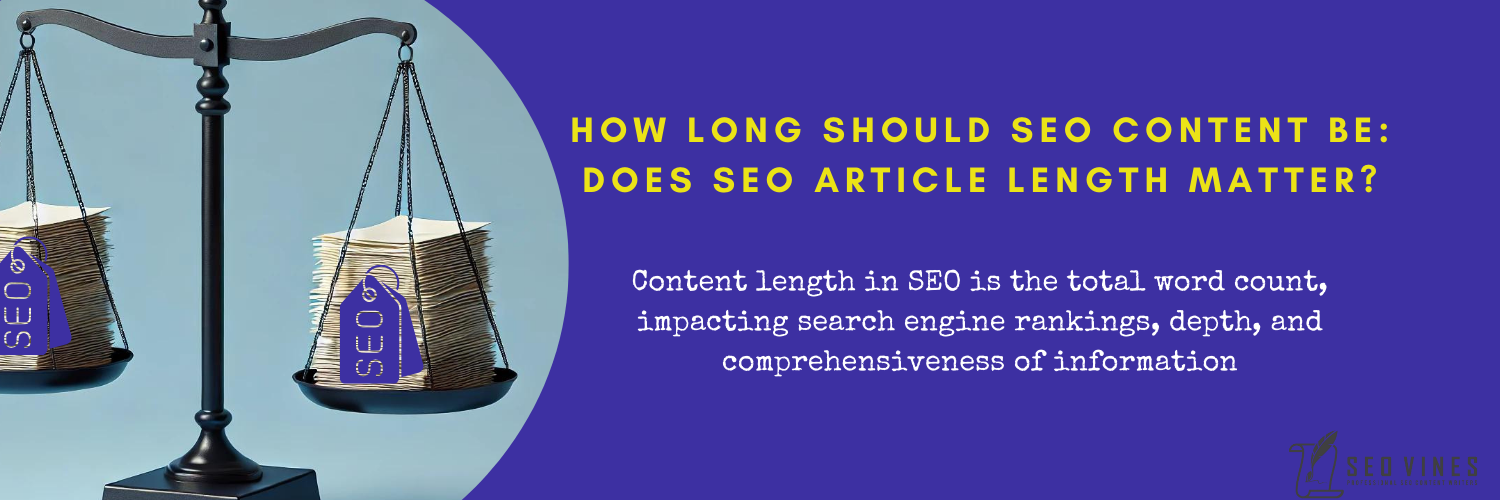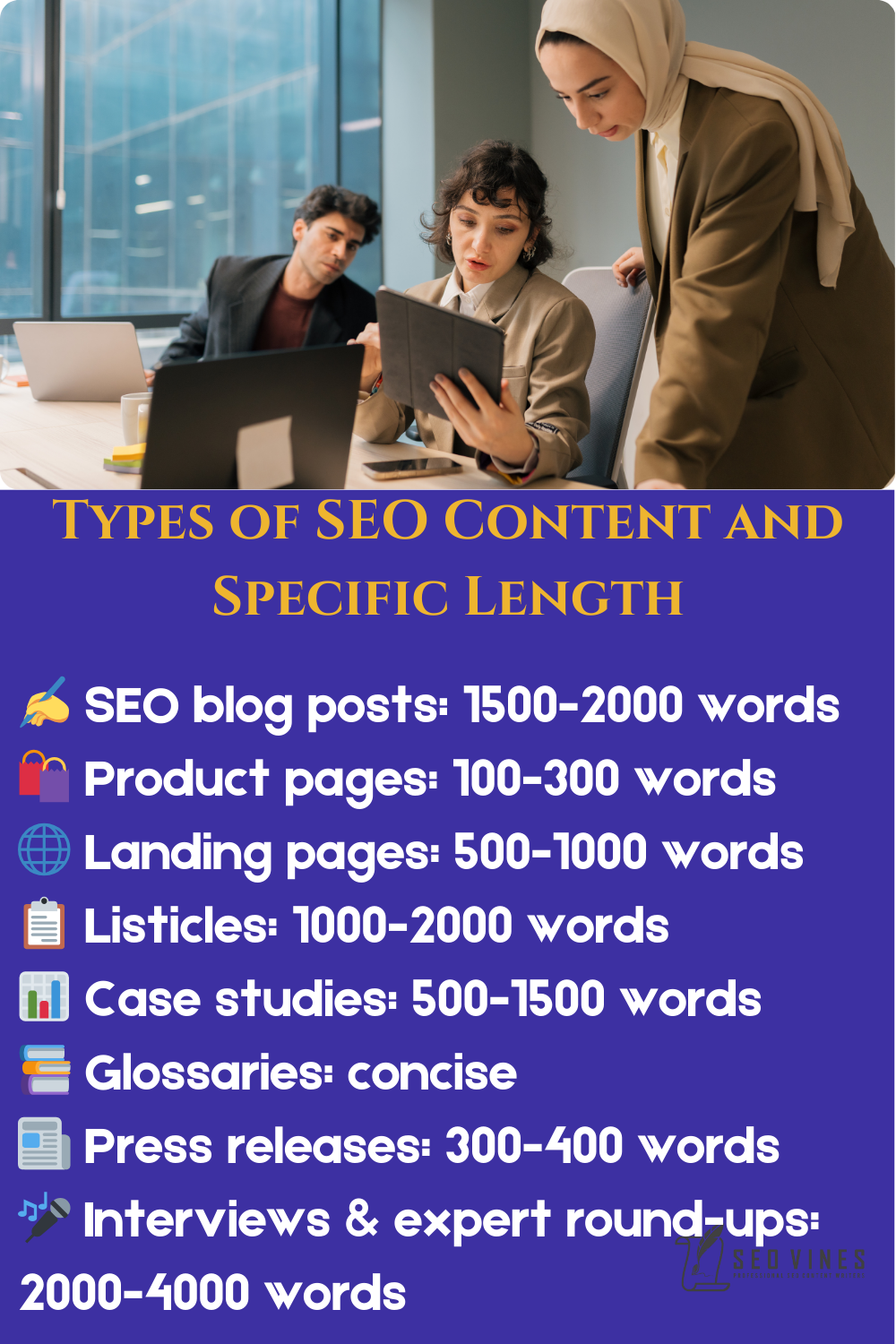Table of Contents
How Long Should SEO Content Be: Does SEO Article Length Matter?
By Benson Reed, Posted: September 18, 2024

Yes, SEO content length or word count matters in SEO content. Comprehensive SEO articles attract more visitors to the website, leading to a high ranking on search engines. It is worth noting that while word count plays a role in SEO, the priority is the quality of the content.
Creating high-quality, valuable, informative, and engaging content boosts ranking. Word count is a tool for depth, but the focus should be on delivering meaningful content that satisfies user intent. The length of an article is influenced by factors such as the article’s topic. Broad topics need more words for comprehensive coverage and clarity.
The type of content. For instance, lists can be effective with fewer words, while guides and tutorials require more words for detailed steps and explanations.
Long-form SEO content increases content authority. Longer articles provide in-depth, credible, and comprehensive information.
Short-form SEO content is also credible, but this is based on the type of content and the quality of the content.
Writing your SEO articles, blogs or even creating infographics requires understanding the user intent and making sure to meet user expectations by providing quality and informative content.
What Is Content-Length in SEO Writing?
Content length in SEO is the total word count, impacting search engine rankings, depth, and comprehensiveness of information. Long content with personal stories and specific keywords can engage and rank well, but Google values substance over sheer length.
SEO blog and article writers must then focus on answering readers’ questions with meaningful, insightful content. Neil Patel’s research suggests that pages exceeding 1,500 words can get up to twice as many Twitter shares. The research supports the belief that longer content generally performs better.
Does Content Length Matter In SEO Writing?
How important is the content length?, Content length is important because of the following factors
- Meeting user’s search intent
- Comprehensive content coverage
- Enhance user experience and engagement
- Length of competitor’s articles or blog posts
What Do Data And Statistics Say About SEO Content-Length?
- According to MarketingCharts, (2024), article content with more than 7,000 words gets more shares
- The average Content-Length of Top 10 Google Search Results – Around 85% of top-performing articles had fewer than 1,000 words. Shorter articles generally perform better, with only 2.7% exceeding 2,000 words.
- The average article Page Views & Shares by Length- Articles under 1,000 words average 3.47 shares, those 1,000-2,000 words average 6.92, while 3,000+ words average 11.07, showing longer content performs better.
- The Average Count of a Post by Rank- For the top 5 Google results, content length tends to be shorter compared to articles ranked lower in the search results.
- The Median Content-Length by Rank for Top 40 Results- Expanding to the top 40 results shows a slight, yet noticeable, correlation between content length and ranking
- Word Count vs. Average Linking Domains – A strong correlation exists between post length and the number of backlinks it receives.
- The Average Total-Content Shares- Most online content is neither shared nor referenced.
- The average 1st result on Google Content has significantly longer content compared to lower-ranking pages, reflecting its higher depth and detail.
Is Long Content Good For SEO?
Do longer articles rank better? Yes, according to Eric Siu,(2024), long-form content is crucial for SEO because it delivers in-depth, valuable information. It’s not just about word count but about thoroughly exploring topics, which benefits both readers and search engines.
Professional SEO content writers understand the need for in-depth information. SEO content writers must be knowledgeable and experts in a given field or industry to meet in-depth and quality writing.
Is There A Minimum Word Count For SEO Content?
No, but the word count should be appropriate to the content type, user intent, and competition
Why Should You Avoid Having Thin Content?
Thin content refers to valueless content due to a lack of relevance and originality. Avoiding thin content is essential because search engines penalize such content, leading to lower rankings, reduced visibility, and a negative user experience, ultimately harming your site’s overall performance.
Hiring professional SEO writing agencies requires understanding the experience and expertise of the available writers. You need to hire writers who avoid thin content, or those who write just to meet the word count. SEO content cost should go hand in hand with SEO content quality.
What Determines SEO Content-Length?
The following are the Factors that Should Influence Your Content-Length
- Content type
- Topic
- Writer authority
- User intent
- Competition analysis
Components of SEO Content and Specific Length
Components of SEO content have specified lengths that determine the entire SEO content word count. Here is a list of various components and the average word count.
- Best URL Length: 50-60 characters
- Title Tag Length: 50-60 characters
- Meta Description Length: 150-160 characters
- Image Alt Tag Length: 100 characters or less
- Heading (H1) Length: 20-70 characters
Types of SEO Content and Specific Length
SEO Content length is determined by the type of content. Here is a list of types of content and the average required length
- The perfect SEO blog post length should be 1500-2000 words
- The ideal Product page length for SEO should be 100-300 words
- Exemplary Landing page length should be 500-1000 words
- The best possible Listicles length should be 1000-2000 words
- An outstanding Case study length should be 500-1500 words
- The superb Glossaries length should be
- The ultimate Press release length should be 300-400 words
- Exquisite Interviews and expert round-ups length should be 2,000-4,000 words

SEO Content Topic/field and Content-Length
Various topics or fields have different content word counts, depending on the authority of the writer and the user intent. For instance, in the medical field, short articles providing brief explanations of conditions, treatments, or health tips may have 600-1000 words.
In the tours and travel field, a blog post with 800-1500 words is Ideal for destination guides, personal experiences, or travel tips. In the beauty department, product pages for review focussing on specific beauty products, their benefits, and user experiences may have a word count of 500-1000 words.
Detailed tutorials on makeup techniques, skincare routines, or beauty tips can be given in a how-to guide of 1000-2000 words. News articles with 400 to 1000 words provide coverage of current events, breaking news, or updates.
A feature story offers in-depth analysis or profiles on significant issues or people in 1000-2500 words.
For journal research, a full research paper with 3000 to 7000 words contains detailed research methodology, results, and analysis.
A review article can be 5000-10000 words with comprehensive reviews of existing literature on a particular topic or field.
Understanding the length of the content you need for your website is one way to measure how much SEO costs, especially in content writing.
Should I Write Longer Content Than My Competitor?
No, even though longer content can be beneficial, the quality of content outweighs the quantity. The focus should be on providing relevant, in-depth content and addressing user intent rather than just increasing word count. Delivering more insight, better examples, clearer explanations, and thorough information in fewer words can be more effective than simply writing longer content. Analyze your competitors’ strengths and gaps to create content that stands out effectively.
Do Readers Like Longer Contents?
Readers like content that meets their user intentions, and answers their queries all the while providing value to them. Long-form content is appreciated when it provides in-depth, valuable information and answers complex questions comprehensively. It can engage readers who are seeking detailed insights or thorough explanations. Content that keeps readers engaged builds trust and encourages further interaction with your site.
How Does User/reader Attention Span Affect Content length?
User attention span plays a crucial role in determining the optimal content length. Readers often skim through content to find the information they need quickly. In a world where information is abundant and distractions are constant, readers often prefer concise, easily digestible content. To keep readers engaged, it’s essential to structure the length of your content to match their attention span, ensuring that it’s long enough to be informative but concise enough to hold their attention.
Does Google Prefer Long-Form Content?
Yes, Google likes detailed long-form content that is quality and meets user intent. Long-form content comprehensively covers a topic primarily for the people and not to manipulate search engines. Long-form content often performs well because it can cover topics in depth, include relevant keywords, and keep users engaged. Google values long-form content that can provide a great page experience which is a requisite for a high ranking.
What are SEO content tools for Word Counters?
The following are SEO word counter tools, which are part of SEO content writing tools
- WordCounter.net
- Grammarly
- Yoast SEO (for WordPress)
- Google Docs (Word Count Feature)
- Hemingway Editor
- Microsoft Word (Word Count Feature)
- SEO Review Tools Word Counter
- Small SEO Tools Word Counter
- SEMrush Writing Assistant
- WebFX Word Counter
Why Are Longer SEO Content Rankings Better?
Longer content articles rank higher due to their thoroughness and incorporation of many major keywords. Longer SEO content can address a wide range of user queries and offer more value, which search engines like Google prioritize. Creating in-depth SEO content enhances relevance and authority making it critical to know how to write SEO content that is quality in length and depth in content. Nonetheless, simply being longer isn’t enough, the content must be high-quality, well-structured, engaging, and accurate to achieve better rankings.
Does Mobile-First Indexing Play a Role in Determining SEO Blog Post Length?
Yes, mobile-first indexing can influence the ideal length of SEO blog posts length by emphasizing the need for content to be mobile-friendly. Shorter, well-structured posts with clear headings and optimized media enhance user experience and engagement on smaller screens potentially improving rankings and reducing bounce rates. This highlights some of the benefits of SEO optimization.
How To Reduce Content-Length?
To reduce content length effectively, begin by identifying and eliminating repetitive, redundant, or unnecessary information. Focus on delivering key points with clarity and brevity, using concise language, and avoiding complex terms. Structure content using bullet points or lists and edit thoroughly to retain only the crucial information needed for the reader’s comprehension and interest. Where appropriate, replace lengthy text with images, charts, or infographics that convey the same information more succinctly.
SEOVines writers understand the need for structured content, making sure to use headings and subheadings, listing, and featured snippets to help readers skim through long-form content.
How To Keep Readers Engaged In Long Content
To keep readers engaged and hooked in reading longer content, make sure to follow these tips
- Clear structure and formatting like the use of headings and bullet points to break the content into easily digestible sections.
- A captivating introduction to capture the attention of readers
- Use of visuals like images, infographics, or videos to complement the text and provide visual breaks.
- Incorporate interactive elements such as polls, or quizzes to increase engagement.
- Summarize key points periodically to reinforce important information
- Remember content is king in SEO
What Is The Cost Of Writing Longer Content?
SEOVINES charges $0.04 to $0.08 per word for longer articles. We make sure the article is quality by creating content that is compelling, clear, and accurate. We then ensure the content is well structured, formatted, and edited to eliminate grammar and spelling mistakes. Longer content is cheaper as you get a discount, which is crucial in calculating your ROI of SEO